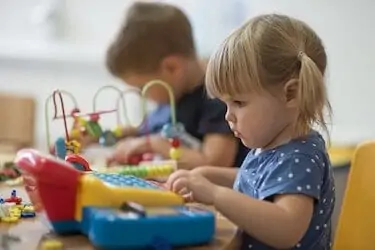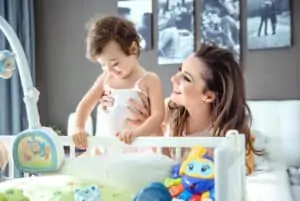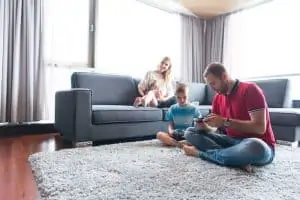Is your kid getting bigger? This is the time of year where many moms start thinking about the upcoming school year, wondering if they should send their child to preschool. If you’re a working mom, you may have already sent your child to a daycare facility that provides a learning environment.
For this post, I’m going to focus my efforts on preschool and give you some important resources to help you out. Preschool requirements vary by state and what is included and isn’t included is something you need to be prepared for.
Some states offer full coverage of preschool while others do not. Some offer partial coverage in that they give you 3 free hours of preschool per day and then you either must pick up your child at noon or put them in a wrap-around program which will cost you a bit extra.
Reading Rockets has a fantastic page of information that can help you better determine what’s happening in your own state for preschool. I strongly suggest you check it out to learn more about what your state offers for preschool. NPR also published a nifty chart about state-funded preschool.
What is Preschool Anyway?
Preschool, also known as Pre-K, is a classroom-based education program for children under 5. In many states, the required age is 4 and the children must be potty-trained to be able to attend. That’s a vast difference from simply daycare, which may be in the same facility. In daycare, your child is basically being babysat. They might do some fun things together and play, but they’re not being prepared for kindergarten, which is the point of preschool.
Is Preschool Mandatory?
Preschool is not mandatory, which is why you might also hear it referred to as “VPK” or voluntary pre-kindergarten. You are under no obligation to send your child to preschool, but most states do have laws regarding enrolling your child in kindergarten as being compulsory. You should check here with the Education Commission of the States for more information about your state.
So, it’s entirely up to you to send your child to preschool or not. Do kids need preschool? The short answer, yes, but I’ll get to that in just a moment.
I’ve sent both of my daughters to preschool. My eldest truly loved it. Then again, she loved school because when I was teaching in Asia at a private school, she got to come with me for free. She was only 3 then, but I didn’t think my mother-in-law could handle both kids at home while I taught. Also, I wanted her to learn how to make friends.

Socializing is very important at a young age and preschool really provides the opportunity. When we moved back to the states, she was eligible for 3 free hours of preschool per day, so we, of course, jumped at the chance. She barely kissed me goodbye when I dropped her off. She’s an honors student now and still loves school.
As for my youngest, she only spent a little time at home with her grandma before we moved away. And then I was home with her all day. I’ve mentioned she’s my clingy one. I tried to get her in playgroups but as my work own home business took off, I had less time to do that. The few friends she did have were from personal friends of mine with kids her age.
I couldn’t wait to get her into school, though being clingy and shy, she was very reluctant. The first few weeks were filled with daily tears on the way there and excited chatter on the way home because she loved it so much. It took her some time, but she stopped crying about going to school and absolutely adored it.
For me, I was thrilled to actually have 3 hours to myself each day. I missed both my daughters, absolutely, but I found I could get so much more accomplished by having 3 hours without interruptions for snacks and such.
For them, I found it to be enriching, a place where they could make friends and learn basic concepts that would prepare them for kindergarten and the rest of elementary school.
When should I send my child to preschool?
It really depends on your state and your child’s readiness, to be honest. If your state pays for your child to go to preschool earlier than the age of 4, you might want to consider taking advantage. If not, you might want to wait unless you’re prepared to pay out of pocket.
Again, those costs are going to vary significantly between states because of what is or isn’t included, your location, whether the school is public or private, and whether or not you need to pay more to have your child stay the full day. It could be anywhere from $3,000 to $20,000. Here’s a bit more information on that.
I had the luxury of choice on my side. With 3 free hours of preschool and just nominal expenses (contributing to parties for the class, purchasing portraits taken on picture day, graduation fees, and little things like that), it was little hardship on our bank account. For others of you though, you might not be in a location where preschool is affordable or feasible.
Does My Child Really Need Preschool?
There’s a lot of debate as to whether or not your child needs preschool. I’m in agreement for early education. Even John Hopkins University makes a great case for it, stating that these early years in life lay a foundation for the future. Plus, the brain develops most of its neurons and is most receptive to learning at an early age. It’s exactly why both my daughters can speak Chinese as easily as they can English. NPR has a wonderful article about that too and cites decades-long studies that children who attend preschool are better prepared for kindergarten.
This article against it makes some truly valid points though, in particular, that children in Europe that learn reading at a later age still learn and that there’s hardly any illiteracy in those countries. While I think pushing children to learn is the main reason people oppose it and can absolutely agree, I also think that preschool affords our children the benefit of social interaction and learning appropriate school behaviors.

In the preschool I sent both my daughters, they had simple homework assignments that usually involved coloring or tracing and we were asked to read to them at least 20 minutes a day. I never felt like my girls were forced to be drilled into numbers, letters, or concepts that were too much for them at their age. The “grades” they received were stars for their behavior and we received periodic charts of their accomplishments with letters, numbers, and concepts, none of which I ever felt was too much.
The idea is to introduce your kids to this world of education to make it less overwhelming when they ARE required by your state to either be enrolled in school or for you to homeschool them.
Which brings me to my next point…
You CAN Homeschool Your Child
And my hat is off to you if you do. Personally, I have far too much to do to sit and teach either of my kids. I’m happy to help with homework and read to them (though my eldest loves to read to her sister and me and I love letting her).
At home, you can teach them by taking them out to the park and showing them the outdoors while pointing out shapes. You can read to them. You can create activities like playing with water or sand to give them hands-on learning. But don’t expect to plop them at a desk for several hours and force them to work. That’s not going to happen.
You can get the best of both worlds by sending your child to preschool and taking the time you have together to work on playful learning methods. I think that’s the best way to excite your kids about education, and I love doing those kinds of things with mine when I’ve got free time.
If you’re going to teach your children at home, teach them well and make sure you meet up with other homeschooled children to help them learn the social aspects to serve them well when they go off to kindergarten.
Choosing the Right Preschool for Your Child
If you decide to send your child to preschool, you’ll want to do your own homework though. Each one varies and your needs vary too. I can’t tell you which preschool near you is best, but with these tips, you can find the right preschool for your child.
- Think about your priorities
Your family’s needs are likely different than mine. Maybe it’s best for your child’s preschool to be closer to your office or your home. Maybe you’d rather drive further to put them in a school with a certain program or something that’s religious. What matters is that it is the right choice for your family. And that it’s safe (keep reading).
- Research it thoroughly
I was lucky in that when we first moved here, one of my childhood friends lived here and had daughters the same age as mine. We chose the school he sent his eldest to and my eldest was in her class together. Thanks to his recommendation and intensive research, I followed up and concluded this would be a great place for us too.
Don’t just go on recommendations though. Do your own research and check it out yourself. Your best friend might have a great experience with one school but someone else you know could have said some awful things about it. This is where your child will go so YOU go make sure you feel comfortable with it there. There’s a free hotline you can use too to ask about resources for preschool and childcare in your area.
You can call 800-424-2246 and ask them your questions about preschools near you and accreditations.
- Visit each one that’s a match
After you conduct your research, head down to your narrowed-down list of preschools and go for a tour alone or with your spouse (you’ll bring your child later…see below) and check things out. Some things to watch for are the class sizes, what activities you see the children doing, how the teachers interact with the children, and the safety and cleanliness of the facility.
Additionally, the director of the preschool should be happy to answer all of your questions with authority and patience. If they seem shifty about anything or don’t make you feel welcome and comfortable, leave. That also goes for any place that doesn’t let you see the facility.
- Let your child choose
Kids never really know what they want, but if you take them over to the preschools you feel most comfortable with, you’ll be able to observe how your child interacts with the other kids and the teachers. Let your child look at the playground and see what they’ll do. If your child seems happier in one preschool over another, then you’re using their choice for a preschool.
Final Thoughts
Preschool has amazing benefits for your child. Both of mine have a huge love of school because of it. It teaches them social interaction and how to share and play nice, things that are hard to teach at home unless you have more children at home or are interacting consistently with other families with kids.
Whatever you do, make sure you make the right decision for your child. Do your research and think about what suits your family best. Good luck!
Leslie Berry lives with her husband and two young daughters in Los Altos, California, where she loves helping other moms get comfortable with motherhood and embracing the insanity with facts peppered with laughs.
She loves eating too much sushi, exercising, and jamming out on her Fender. Read more about Leslie here.






